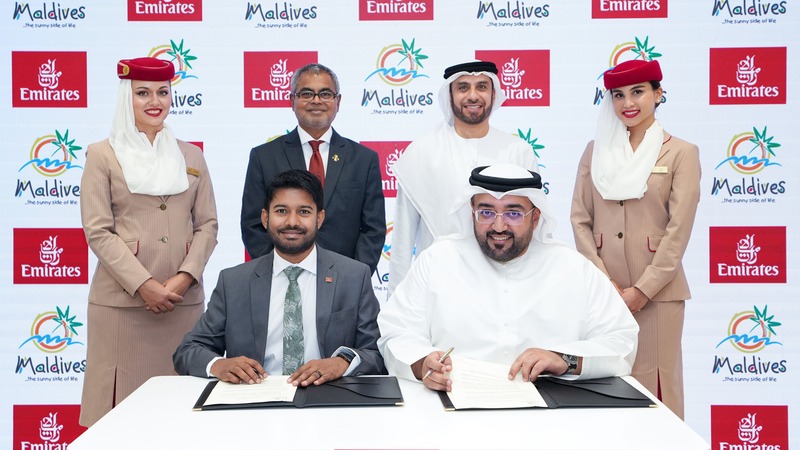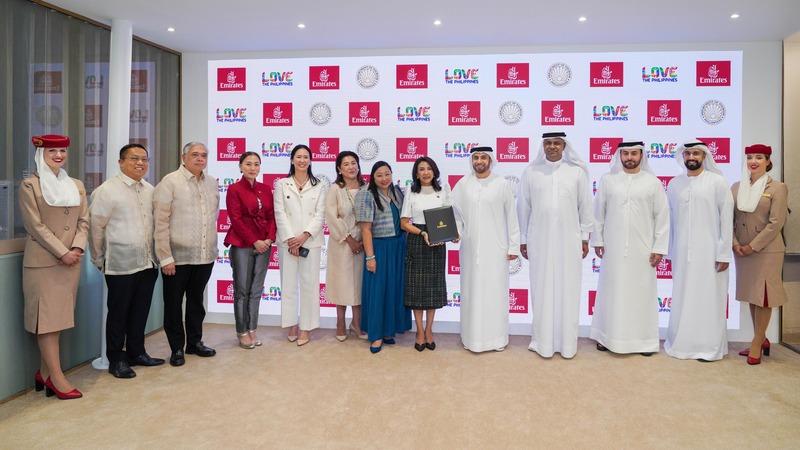.jpg)
Emirates Airline has made a powerful statement on the opening day of the Arabian Travel Market (ATM) 2025 by signing eight comprehensive Memoranda of Understanding (MoUs) with key tourism boards from around the world.
These agreements mark a significant step in Emirates’ ongoing commitment to revitalizing global travel and tourism in the post-pandemic era.
By partnering with destinations across the Middle East, Asia-Pacific, Africa, and Europe, Emirates aims to leverage its extensive global network of over 140 destinations and its position as a leading international carrier to stimulate inbound tourism, foster economic growth, and enhance cultural exchange.

Strengthening UAE’s Tourism Ecosystem: Partnership with Sharjah
One of the cornerstone agreements was signed with the Sharjah Commerce & Tourism Development Authority (SCTDA), reflecting Emirates’ strategic focus on promoting the UAE’s diverse tourism offerings beyond Dubai.
This collaboration seeks to position Sharjah as a premier cultural, heritage, and eco-tourism destination within the UAE, complementing Dubai’s cosmopolitan appeal.
The partnership will facilitate the development of tailor-made travel packages that integrate Sharjah’s rich history, museums, traditional souks, and natural reserves into broader UAE itineraries promoted through Emirates’ ‘Dubai Experience’ platform.
Joint marketing campaigns will target key source markets in Europe, the Middle East, and Asia, supported by familiarization trips for travel agents, media, and influencers to experience Sharjah’s unique attractions firsthand. The initiative also focuses on sustainability, aligning with Sharjah’s recent efforts to promote responsible tourism and environmental conservation.

Expanding Reach in Asia-Pacific: Multi-Destination Collaborations
Emirates has forged strong ties with four prominent tourism boards in the Asia-Pacific region, underscoring the airline’s commitment to boosting travel between the Middle East, Europe, and some of the world’s most sought-after leisure destinations.
Philippines Department of Tourism:
The partnership aims to increase visitor arrivals from Emirates’ key markets through coordinated marketing campaigns highlighting the Philippines’ pristine beaches, vibrant festivals, and cultural heritage. Familiarization trips and joint participation in trade shows will help deepen relationships with tour operators and travel agencies, while digital campaigns will target affluent travelers seeking authentic island experiences.
Maldives Marketing and Public Relations Corporation (MMPRC):
Building on Emirates’ long-standing presence in the Maldives since 1987, this MoU focuses on enhancing luxury tourism through bespoke travel packages, joint advertising, and trade development initiatives. Emirates will support Maldives’ efforts to attract high-net-worth travelers by promoting exclusive resorts, wellness retreats, and eco-friendly tourism options.
Tourism Authority of Thailand (TAT):
Emirates and TAT will collaborate on multi-channel promotional campaigns to highlight Thailand’s diverse offerings, from bustling Bangkok and historic Chiang Mai to idyllic islands like Phuket and Koh Samui. The partnership will leverage Emirates’ extensive network to stimulate demand from Europe and the Gulf region, supported by media familiarization trips and participation in international travel fairs.
Japan National Tourism Organization (JNTO):
This collaboration aims to increase awareness of Japan’s rich cultural heritage, seasonal attractions such as cherry blossom viewing, and modern urban experiences. Joint digital marketing initiatives and trade engagement programs will target Emirates’ global clientele, encouraging longer stays and multi-city itineraries that include Tokyo, Kyoto, and Osaka.
Renewed and New Partnerships in Europe and Africa
Emirates also renewed and expanded its strategic partnerships in Europe and Africa, reinforcing its role as a key driver of tourism growth in these regions.
Uganda Tourism Board: Following a successful 2024 that saw a 16% increase in passenger traffic on the Dubai-Entebbe route, Emirates and Uganda Tourism Board have renewed their MoU to continue promoting Uganda’s world-renowned safari experiences, including gorilla trekking in Bwindi Impenetrable Forest and wildlife viewing in Queen Elizabeth National Park.
The partnership will focus on trade engagement, media familiarization, and joint marketing campaigns to attract adventure travelers and eco-tourists.

VisitBritain: Emirates signed a declaration of intent with VisitBritain to enhance UK tourism by jointly promoting iconic destinations such as London, Edinburgh, and the Lake District. The collaboration will target Emirates’ key markets in the Middle East, Asia, and Australasia, emphasizing cultural heritage, city breaks, and events. This partnership also aims to boost business travel and MICE tourism by facilitating joint participation in trade shows and conferences.
Hungary Tourism Board: Emirates’ new partnership with Hungary highlights Budapest’s appeal as a cultural and wellness destination, famous for its thermal baths, historic architecture, and vibrant festivals. The collaboration will focus on co-marketing efforts and travel trade development to increase visitor numbers from Emirates’ European and Middle Eastern networks.
Strategic Vision: Driving Connectivity, Innovation, and Sustainable Tourism
These agreements align with the overarching theme of ATM 2025, “Developing Tomorrow’s Tourism Through Enhanced Connectivity,” showcasing Emirates’ vision to act as a global connector between emerging and established markets.
Emirates’ Deputy President, Adnan Kazim, emphasized the airline’s commitment to fostering economic growth and cultural exchange through innovative partnerships that combine extensive flight connectivity with cutting-edge digital marketing and sustainable tourism initiatives.
The MoUs also reflect Emirates’ focus on integrating technology and data-driven insights to tailor marketing strategies, improve customer experiences, and support travel trade partners. Initiatives such as IBTM@ATM, a dedicated platform for MICE industry collaboration, and the expanded Travel Tech zone at ATM demonstrate Emirates’ commitment to leveraging technology to enhance tourism development.
Economic and Tourism Impact: A Catalyst for Growth
By signing these MoUs, Emirates is positioning itself as a catalyst for global tourism recovery and growth, particularly at a time when international travel demand is rebounding strongly. The airline’s ability to connect diverse destinations through its Dubai hub enables partner countries to tap into new markets and attract high-value travelers, including leisure tourists, business travelers, and MICE delegates.
The partnerships are expected to generate significant economic benefits for the involved destinations by increasing visitor arrivals, lengthening stays, and boosting spending on hospitality, retail, and cultural experiences. Furthermore, the focus on sustainability and responsible tourism supports long-term destination resilience and community development.
Looking Ahead
As Emirates continues to expand its fleet and route network, these strategic collaborations will play a vital role in shaping the future of global travel. By fostering close cooperation with tourism authorities and industry stakeholders, Emirates is helping to build a more interconnected, innovative, and sustainable tourism ecosystem that benefits travelers, businesses, and destinations alike.
With these landmark agreements signed at ATM 2025, Emirates is not only reinforcing its leadership in global aviation but also championing a new era of collaborative tourism development that promises exciting opportunities for the travel industry worldwide.

.jpg)
 (1).jpg)


.jpg)





.jpg)







.jpg)
.jpg)
.jpg)







.jpg)

.jpg)





.jpg)

 (1).jpg)





.jpg)







.jpg)
.jpg)